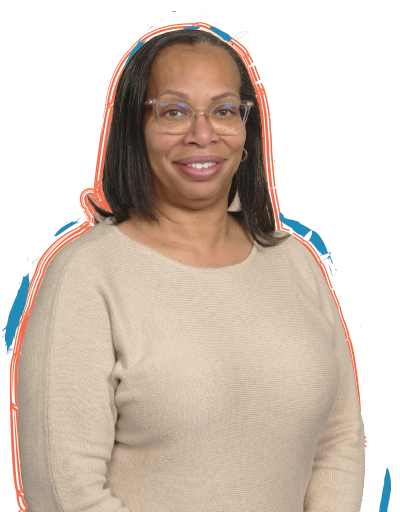

“Like so many of us, I chose to become a veterinarian as a very young child,” says Dr. Coretta Cosby Patterson. “I was in first grade and read a book called What I Want to Be from A to Z and V was for veterinarian.” The next factor for Patterson was her father, who is from rural Alabama. Patterson spent every summer there with her family, and her grandfather and uncle had goats, pigs, rabbits, chickens, ducks, guinea fowl, and horses. Her time watching her family tend to those animals, combined with her love of science, made veterinary school seem like a logical choice. She graduated in 1995 with her DVM degree from the University of Illinois Urbana-Champaign and completed an internship in 1996 and a residency in 2003 at Michigan State University.
In addition to a love for animals, Patterson also fostered a love of mentorship. She was passionate about advocating for students and forming impactful relationships with them. When she moved to Columbus, Ohio, in 2021, Patterson was working as a group medical director for Blue Pearl Hospitals and wasn’t necessarily looking for a new job. However, when Patterson met the dean of The Ohio State University College of Veterinary Medicine and learned that the newly vacant position of director of the office of professional success involved a lot of the mentorship she craved, she elected to apply for the job. “The position really spoke to me,” says Patterson. “I had more insight into life after veterinary school and in practice than I had ever had before, and I felt that sharing that with students might be valuable to them.”
Now, six months into the position, Patterson’s days are filled with a variety of duties. “The new curriculum here is only two years old. In that curriculum, students have a communication course each semester, as well as a course called professional development. I do some teaching in these courses, observe students in simulated communication labs, and help deliver meaningful materials to our students in those courses. I am also a co-advisor to the students in the James H. Bias affinity group. Students come to my office to vent, for advice, for snacks, and for information about options for externships, internships, and careers.”
Her work in this affinity group, as well as her day-to-day experiences in the position, exemplify why diversity in the profession, and in faculty positions like hers, is so vital. “Having faculty from diverse backgrounds who are members of groups that have been historically marginalized helps other students to consider those types of jobs,” says Patterson. “We can and should also consider that if in human medicine, folks do not seek care when they cannot locate practitioners that look like them, this is likely true in veterinary medicine as well. Perhaps care of animals would improve if the profession had more diversity. When I worked with Vetward Bound, a summer enrichment program for undergraduate students interested in veterinary medicine, each year, a student or two (or five) would share that I was the first Black female veterinarian that they had met. I do believe that humans are capable of amazing things, but I also believe it is easier to want to be something that you have seen someone else become. It makes it seem more of a reachable goal.”



Cheri Johnson was my advisor during my residency; I quote her on a weekly basis! One of my favorite quotes from her is, ‘The only thing that I can judge your future performance on is your past performance.’ I spent a ton of time listening to students when I was at MSU and learned, most importantly, that students know the difference between saying you care about them and genuinely caring about them.
- PattersonPatterson’s favorite part of the job is teaching students and talking to them about any concerns they might have. A lot of the guidance she shares with them is a direct result of her time at Michigan State. “Cheri Johnson was my advisor during my residency; I quote her on a weekly basis! One of my favorite quotes from her is, ‘The only thing that I can judge your future performance on is your past performance.’ I spent a ton of time listening to students when I was at MSU and learned, most importantly, that students know the difference between saying you care about them and genuinely caring about them,” Patterson says.
Patterson encourages others who are interested in mentoring to explore opportunities and to do some preliminary research. “If you may want to be a mentor but are uncertain, Google it! It’s easy to learn about what they do and how they do it.” As a bonus, Patterson has found that relationships that started out as a mentor/mentee dynamic often grow into treasured friendships. “That is the absolute best part,” she says. “The relationships meld into something so much more.”
